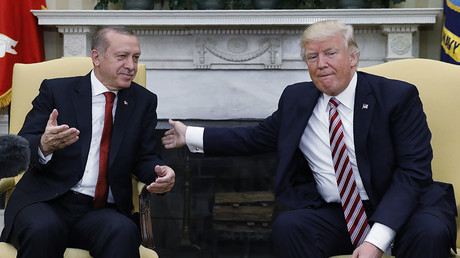Sunday, 19 November 2017
Erdogan accuses US of financing ISIS, breaking promises in Syria
Turkish President Recep Tayyip Erdogan has accused Washington of betraying Ankara and providing “a lot of dollars” to the Islamic State terrorists. The allegation comes just days after the US acknowledged that it allowed hundreds of armed ISIS militants to escape the besieged Syrian city of Raqqa.
“That’s the headline. But what did you do? You paid a lot of dollars to [ISIS],” Erdogan said, as cited by AFP.
It’s not the first time Erdogan has called out Washington for enabling terrorists. Last December, the Turkish president caused quite a stir in the media, claiming that Turkey had “confirmed evidence, with pictures, photos and videos,” of the US supporting Islamic State (IS, formerly ISIS, ISIL) and Kurdish militias, outlawed as terrorist in Turkey.
Erdogan’s comments come just days after the BBC revealed on Monday that the US-backed SDF allowed hundreds of ISIS militants to escape Raqqa with the silent approval of their coalition allies that preferred not to intervene. Truck drivers interviewed by the BBC said they were offered thousands of dollars to secretly transport ISIS fighters and “tons of weapons and ammunition” out of the city. At the time of the exodus, neither SDF, nor the coalition acknowledged their involvement in the deal, reportedly struck by local officials mid-October.
When confronted by the BBC, US-led coalition spokesman Col Ryan Dillon admitted that “a Western officer” was present as the deal was being arranged, but “didn’t take an “active part” in the talks, he told the BBC. While the extent of the US involvement in the deal is up to speculation, Dillon noted that part of the agreement was to allow the coalition to screen the “ISIS-aged males” and civilians. However, only four “foreign fighters” were detained by the SDF from some 3,500 people, 300 of which were identified as “potential ISIS fighters,” Dilon said.
Then on Tuesday,Moscow accused US forces of refusing to carry out airstrikes against ISIS convoys retreating from the eastern Syrian city of Abu-Kamal. The Russian Ministry of Defense stated that it twice asked the US-led coalition to strike the convoys with the US side “categorically refusing” to do so, the ministry said, attaching photos purportedly showing ISIS convoys leaving the city unhindered.
Aside from sparing the ISIS militants, the coalition warplanes have also been hampering the Russian Air Force’s operation in support of the Syrian military, the ministry claimed, noting that in accordance with the prior agreement the coalition aircraft should not have been flying in the area.
This is hardly the first time Moscow has accused Washington of tolerating ISIS’s presence in Syria. In September, Russia’s Defense Ministry has released aerial images allegedly proving that US Army special units provide free passage for the Syrian Democratic Forces (SDF) through the battle formations of Islamic State (IS, formerly ISIS/ISIL) terrorists.
The Turkish president also slammed Washington for its ongoing support of Kurdish groups fighting in Syria — despite promises that they would be withdrawn from liberated cities.
“It was a big disappointment for us that America has not kept its promises, to a large extent, since the start of the Syrian crisis,” said Erdogan, claiming that the previous US administration pledged to not let YPG fighters to take Raqqa, Manbij and Deir ez-Zor.
“We don’t want to enter into the same game in Afrin. A problem that we could solve quite easily together as allies is being dragged out by American intransigence,” he added, as cited by AFP.
Disagreements over the status and future of Syria’s Kurds have strained relations between Ankara and Washington. Turkey views the Kurdish YPG militia, which is backed by the US-led coalition, as a terrorist organization.
Washington has stressed that while it’s aware of Turkey’s security concerns, its policy of arming the Kurds is “necessary to ensure a clear victory” in Raqqa.
Ankara claims that the US-backed YPG is not fighting ISIS in Raqqa but instead aiming to capture the city and “engaged in regional cooperation” with the so-called caliphate.
More recently, Erdogan has warned that the Turkish military may intervene to close the“terrorist corridor” in Syria’s Afrin region, which borders Turkey and is currently controlled by Kurdish groups.
The views expressed in this article are the sole responsibility of the author and do not necessarily reflect those of the Blog!
Subscribe to:
Post Comments (Atom)












No comments:
Post a Comment